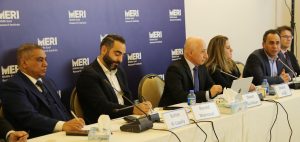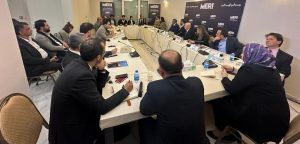A Joint MERI-Chatham House Policy Debate
Iraq’s struggle for rule of law dominated a recent policy debate hosted on 23 January 2024 by MERI jointly with the UK based Royal Institute of International Affairs, otherwise known as Chatham House. Despite boasting a constitution and state bureaucracy, Iraq’s pursuit of rule of law remains arduous. The lack of political will, widespread impunity and entrenched corruption paint a concerning picture, where powerful individuals operate above the law. With this background, this hybrid (online and in person) debate highlighted the intricate realities of the nation’s political landscape, and reflected on a recent study published by Renad Mansour, Director of Iraq Initiative at Chatham House.

Participants acknowledged that understanding the deeply ingrained political and security system in Iraq requires examining corruption as the central lens through which power dynamics operate. Its pervasive influence stifles reform efforts and fuels public frustration.
While accountability should be a tool for reform, in Iraq it’s often wielded for political maneuvering and scoring points. This misuse, coupled with poor implementation, weakens its effectiveness, particularly in a fragile state like Iraq. However, amidst these challenges, glimmers of hope emerge from public pressure and ideological shifts. Participants identified a crucial need to shift the narrative around accountability, focusing on its potential as a genuine driver of reform rather than a political weapon.
Several obstacles hinder the path to reform. Institutional gaps, like the lack of federal courts, exacerbate the existing problems. Additionally, powerful figures shielded from scrutiny and a controlled media landscape present formidable challenge. However, the recent wave of Tishreen protests highlights a shift in public discourse, with homegrown politics and a burgeoning civil society taking root. Recognizing the potential of these nascent movements, participants emphasized the importance of empowering and connecting individuals within the system who still harbor a passion for reform. By creating networks and amplifying their voices, these internal agents of change can wield greater influence and push for meaningful reforms from within the system itself.

Though despair might seem tempting, cautious optimism offers a counterpoint. Civic engagement, empowered individuals, and an evolving business landscape create a ground for positive change. Participants acknowledged that societal growth takes time, and direct solutions might be premature. However, they drew hope from the cracks in the seemingly monolithic political elite highlighted by recent communal movements. Ultimately, the current consociational system fails to serve the majority of the public. Finding a framework that benefits all Iraqis requires working within the existing system while fostering dialogue and advocating for reform.
Speakers:
- Chairman: Dlawer Ala’Aldeen, President of MERI
- Paper presented: Renad Mansour, Chatham House, Director of Iraq Initiative
Discussants:
- Abdul-Rahim Al-Uqaily, Former Head of Commission of Integrity
- Shahla Al Kli, Non-Resident Scholar, Middle East Institute
- Yama Torabi – UNDP Anti-Corruption Chief Technical Advisor

